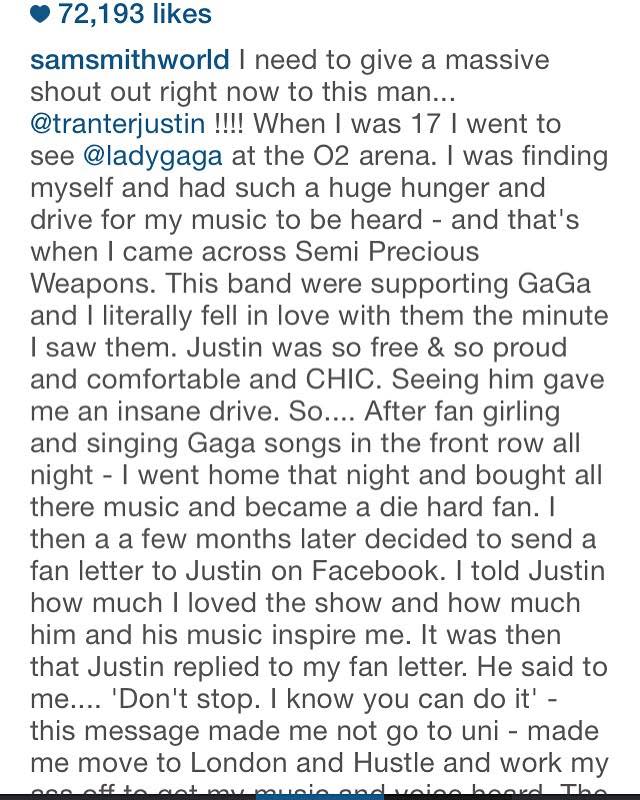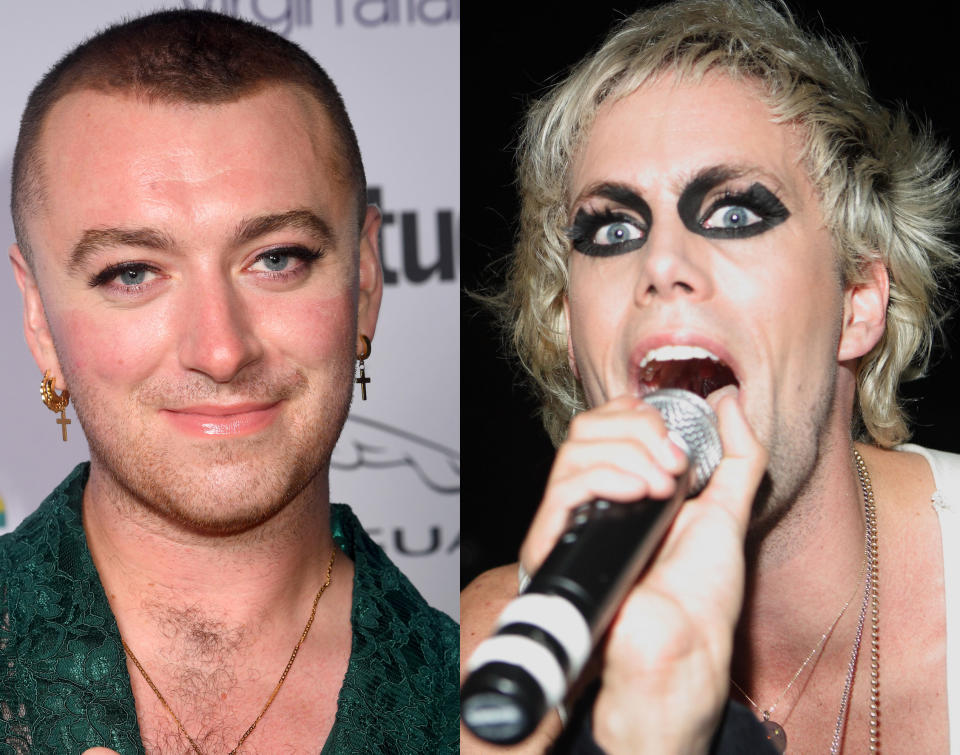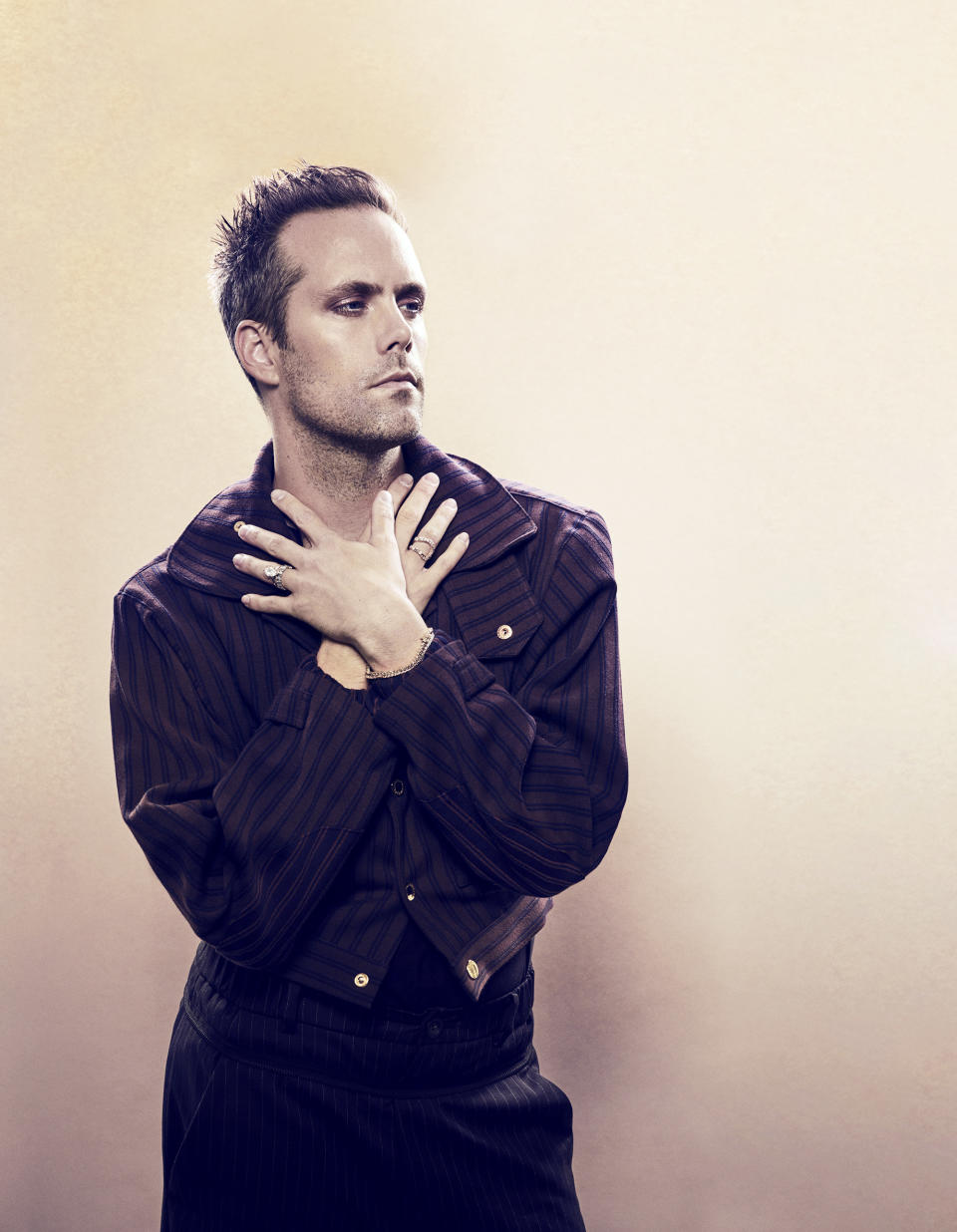Hitmaker and GLAAD activist Justin Tranter talks inspiring Sam Smith, femmephobia, and why ‘the fight is still not over’
Oct. 17 is Spirit Day, a holiday set up to support queer youth and protest anti-LGTBQ bullying, and superstar songwriter/GLAAD board member Justin Tranter will be celebrating with their annual A-list party at the Sunset Room in Hollywood. Tranter is one of music’s most in-demand pop songsmiths, with a résumé of co-writing credits (often alongside songwriting partner and Julia Michaels) that includes Justin Bieber’s "Sorry,” DNCE’s "Cake by the Ocean,” Halsey’s “Bad at Love,” Imagine Dragons’ “Believer,” Janelle Monáe’s "Make Me Feel,” Gwen Stefani’s “Used to Love You,” Fall Out Boy’s "Centuries,” and Selena Gomez’s "Good for You" and "Bad Liar.” But Tranter wasn’t always so successful or accepted.
Before their breakthrough as a Grammy-nominated songwriter, Tranter, whose preferred gender pronouns are they/them, faced a sort of industry bullying of his own as his NYC glam-punk band, Semi Precious Weapons, bounced around from record label to record label. The band had diehard fanbase (which included celebrities like Kate Moss), as well as ties to David Bowie producer Tony Visconti (who produced SPW’s debut album) and Lady Gaga (who came up with them in the same scene, executive-produced their second album, and had them open for her Monster Ball tour). And yet, record company executives were constantly suggesting that Tranter tone down their effeminate, flamboyant persona. All this homophobia and femmephobia eventually wore Tranter down, leading them to embark on an ultimately more lucrative career behind the scenes.

But little did Tranter known that despite their failure to break through to the mainstream, they had made an indelible impression on a teenager who would go on to become one of the most successful LGBTQ pop stars of all time: another diehard celebrity fan, Sam Smith.
“It was really beautiful,” Tranter tells Yahoo Entertainment. “Before Sam and I became friends, many years ago they saw Semi Precious Weapons open for Lady Gaga. They sent me a message on Facebook afterwards and said how inspired they were by my performance, and how seeing me up onstage gave them faith that they can go and take over the music business too. And I was like, ‘Well, we haven't taken them over, exactly, but I'm glad I inspired you!’ And then when I started having a bunch of hit songs, Sam posted this beautiful Instagram post, kind of letting the whole world know how important I was to their journey, which was unbelievable.”
Smith’s Instagram post read: “I told Justin how much I loved the show and how much him and his music inspire me. It was then that Justin replied to my fan letter. He said to me… ‘Don’t stop. I know you can do it’ — this message made me not go to [university] — made me move to London and hustle and work my ass off to get my music and voice heard.” Tranter cried when he read Smith’s words.

“We've become friends since then, and to see the way that Sam is living in their truth so publicly, in such a specific, special way, I think is beyond admirable,” says Tranter of Smith, who identifies as genderqueer/non-binary and recently has given many outspoken interviews about his gender struggle. “In Jameela Jamil’s ‘I Weigh’ series, [Smith] brought up again the inspiration of seeing me live so unapologetically in my six-inch heels and full makeup in 2010. It's moments like that where all the craziness [Semi Precious Weapons] went through and all the money we lost, Sam Smith getting confident from just the way that I was living makes it worth every penny.” (See Smith speak to Jamil about Tranter’s influence in the video below, around the 6:45 mark.)
Tranter says they and Smith “have written some songs together. … I don't know if they'll come out, but we had a f***ing blast together.” But clearly Tranter is having a blast all the time, living their best life and proving wrong all the industry naysayers who didn’t believe in them. In Yahoo Entertainment’s fascinating Spirit Day interview below, Tranter explains why they’re using their fame as a weapon, of sorts, to pave the way for other misunderstood and marginalized musicians.
Yahoo Entertainment: When you spoke on a panel at a recent Billboard Pride summit, you said when you were in Semi Precious Weapons, you had issues with record labels thinking your image was “too feminine,” or “too gay,” or too whatever. Can you elaborate on what you went through?
Justin Tranter: We had no one really sticking up for who I was as a human being. When executives are telling an artist, "We need to edit this shot out [of your music video] because your hand is moving way too feminine,” they don't realize that they're asking them to hide a part of themselves. You're telling them that a part of themselves is too shameful for the general public to buy into it. I think if you were ask them, these people would never, ever identify as homophobic, they’d be all for marriage equality, and they probably think Trump sucks. But 10 years ago, they were telling us of some queer people to stop being so femme publicly. And this was damaging to me in ways I didn't even realize back then. You can see in the last album Semi Precious Weapons made, we really did change the way I looked — the whole band did, but especially me. I was thinking, "Well, maybe they're just trying to like do the right thing for me." And then you realize, "No, that was the exact wrong thing for me." Our fans hated it.
So when I met Katie Vinten [then the head of A&R at the Warner/Chappell publishing company, now the co-founder, with Tranter, of Facet Records] and she started opening doors for me as a songwriter for other people, I just said, "You know what? F*** this. I'm going to do [songwriting]. I don't want anyone to talk about my outfit ever again. I don't want anyone to talk about the way my hand moves ever again." And if I'm behind the scenes, it's just all based on my talent.
Now, I’m not saying it's that super-easy for any marginalized person to break through in the songwriting world. It's a very bro-y culture in a lot of way, and bros like to hang out with bros — not in a malicious way, it's just human nature. But human nature needs to be f***ing changed. But yeah, the decisions I was making then, I wasn't even really consciously aware of why I was making them. Luckily, it turned out great for me, and now I have a platform as a "hit songwriter" that I can use to try to make the change in the industry that I wish had been there for me.
It's amazing to me that people at your labels would have said that stuff to you back then because, um, did they not see Semi Precious Weapons before they signed you? Did they not know what they were getting into? I mean, you paraded around in makeup and stilettos.
In my experience — and we were signed four times, and it happened all four times — they would come and they would see a show, and they would see the fans losing their f***ing minds. The clubs were always packed, sold-out, overflowing, lines around the block with young kids. And you know, our fanbase was I would say maybe only 30 percent queer; it was a very diverse fanbase. The labels would get excited [by this audience response] and sign us, but then they'd be like, "OK, but if you want the whole world to love you, we need to change everything." It was a weird mindf*** that kept happening. And the last time it happened, I was 32 or 33, and I was like, "Well, I guess I should give this a go, because maybe I should've listened to these people all along." And so we gave it a go. And then the band ended.
This seems like a regression, because there were a lot of androgynous, flamboyant, and openly gay pop artists in the 1980s.
There's an HIV and AIDS conversation to have in there that someone much smarter than me needs to analyze. I think once the stigma and the fear of HIV and AIDS really took over the whole planet, feminine men really started to very quickly disappear from pop culture — literally and figuratively. ... So there's many reasons why it's happened, but it's time for femme people to start taking over pop culture again. Because we're really good at it! I do feel very hopeful, though. You see Sam Smith living in their truth more than ever. Lil Nas X has the biggest song of all time. There's a lot of things to be grateful for, and a lot more hope to come. But the fight is still not over.
You’ve said before that you believe a lot of femmephobia is actually rooted in misogyny.
I do think that, especially when it comes to someone who the world has assigned as male but is living femme in some way. There's many different, varying degrees of femme, but I think that the world views being a woman as such a horrible thing that when they see a man — or what they decide is a man — expressing femininity, or expressing admiration for anything feminine, they view that as an insult to masculinity and to these fake masculine gifts you have supposedly been given. They view anyone who is trying to be femme as betrayal: "Why are you trying to be the worst thing in the world?" Because a lot of men in this world view being a woman as the worst thing you can be.
You’ve also said something like the new frontier of the LGBTQ fight is not so much about sexuality now, but about gender. Why do you think that?
I think the new frontier of the fight is just about accepting people on a spectrum… whether that's the spectrum of sexuality or the spectrum of gender — the idea that those things can be fluid, that bisexual men actually do exist. Like, do I want to transition genders? No. But have my whole life have I only identified with the female perspective and only looked up to the female perspective and worshiped the female perspective? Yes. And has my mother called me "she" half of my life by accident? Yes — and I take that as the greatest compliment ever. I want to be able to live in this space where I love my femininity and don't need to put rules on it. For people who do want to live on the binary, whether they are cisgender or transgender, that is f***ing amazing. There are a lot of us who live in this non-binary world, and I think that's definitely the next thing to try to help the planet understand.

Now that you've reached this level of success, do you have any future plans to write more political songs or songs that address these issues?
Yeah, I’m working with a couple of young artists; one of them doesn't even have music out yet. She and I are speaking very politically in the songs that we’re putting together for her album. Because you know, it's going to take 16-year-olds to have the f***ing guts to do this. In a lot of stuff that I've done with Bea Miller, we are speaking politically; even if it's just a couple of lines here and there, we're still doing the damn thing. A lot of that stuff that I'm in the process of developing is very political, including a TV project that is about my life as a teenager in the ‘90s, using the parallel of the homophobia and femmephobia that I experienced then and how that is all happening again — but this time, it's coming from the highest offices.
What are your biggest sociopolitical concerns right now?
I'm actually very hopeful right now. I'm hopeful for many reasons. I'm hopeful because of Lil Nas. I'm hopeful because of Sam Smith. I'm hopeful because a lot of corporations and entertainment companies are really stepping up to the plate to make sure that diverse stories are being told. There's still a lot more to do, and a lot more diversity needs to exist in every part of entertainment, but people are trying to step up, and that makes me hopeful. The whistleblower makes me hopeful. Young kids that I work with make me hopeful. But I think there's a lot of joy coming, a lot of light coming, but the fight to get there might be the hardest thing that I have ever seen.
The fight that we are about to have might be the hardest thing ever. So I'm concerned with the vote that's happening in the Supreme Court on to decide if LGBTQ people can be fired simply for being LGBTQ. The fact that that's even going up to the Supreme Court is terrifying. That the case got that far makes me terrified. But I'm ready to fight it if the decision goes the wrong way. I'm terrified by the violence and the lies that Trump and his team spread and are inciting — the violence they're inciting is scary, and I think it could get scarier, especially with his impeachment coming — but I'm ready for the f***ing fight. And I know a lot of other amazing people are too.
What do you say to people who think that musical artists, and celebrities in general, should just “shut up and sing" and stay out of politics?
Well, most people who say that are people who voted for a f***ing game show host. You voted for a game show host, so you no longer can complain about celebrities having political opinions, because your president is a television game show host! At least artists [who often spout political opinions] like Lady Gaga and John Legend are writers, thinkers, performers, who perfected their crafts for years and years and years. Now, there are some great game show hosts out there, but I don't think you can go to college to be a f***ing game show host. So if you don't want to hear artists’ political point of views, then why did you vote for a game show host? That's one point.
And then two, to any artists out there who's afraid of being political: If the dream was just to write songs and have people hear them and you don't want to get involved, that's fine… except when people’s basic human rights are being violated. LGBTQ people are at threat of losing their jobs. Families are being separated at the border. Black people are being killed by the police. If you have any sort of platform and you are not going to speak up about these issues, that's disrespectful. That is irresponsible. In a time that we're living in now, if you're not speaking out against this, you are speaking for it.
Read more from Yahoo Entertainment:
Sam Smith on coming out as nonbinary: 'It was a torture' in 'my mind'
Lil Nas X comes out as gay on last day of Pride Month: ‘Thought I made it obvious'
Judas Priest’s Rob Halford wants to be a judge on ‘RuPaul’s Drag Race’
Follow Lyndsey on Facebook, Twitter, Instagram, Tumblr, Spotify.
Want daily pop culture news delivered to your inbox? Sign up here for Yahoo Entertainment & Lifestyle’s newsletter.


